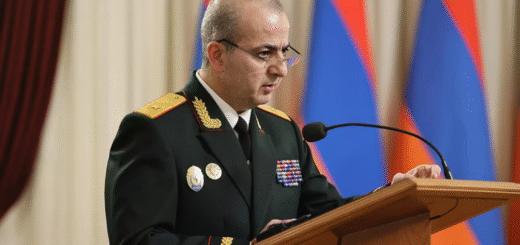Aishat Baymuradova, 23, was found dead in a rented apartment in the Armenian capital, Yerevan, on October 20, three days after she was reported missing. Human rights activists, who believe she was likely strangled, demand answers from Armenian authorities over what they describe as an apparent transnational “honor killing.” They suspect involvement of individuals linked to Chechen security structures.
Alipat Sultanbekova, a Russian activist who moved to Armenia to escape prosecution for allegedly discrediting the Russian army following Russia’s invasion of Ukraine, told RFE/RL’s Armenian Service that Baymuradova had met online with a woman later revealed to have ties to people close to Chechen leader Ramzan Kadyrov. After meeting that woman and a man one evening, Baymuradova disappeared, she said.
Security camera footage reportedly captured several people entering the building, including a Chechen man who, according to unconfirmed reports, had previously been accused of financing the Islamic State militant group.
Sultanbekova said this is the first known case of a Chechen woman being killed abroad after fleeing domestic violence. “Usually, the relatives or Chechen security agents take such women back home, where they are killed later,” she said.
“In Chechnya, if a family member is seen as having brought shame on the family, they are killed in what’s called an ‘honor killing.’ The same happened to Aishat,” the activist said, adding that Baymuradova had fled after being separated from her child, who remained with the father in Chechnya.
Suspected Links To Kadyrov Family
According to several reports cited by the BBC, Baymuradova had family ties to Ramzan Kadyrov, the powerful head of Russia’s Chechen Republic. She told friends her grandmother was a cousin of Kadyrov’s father, the late Chechen president Akhmad Kadyrov.
Independent Russian outlet Vazhniye Novosti reported that her father was a retired soldier and possibly a police operative, while her uncle works in the Chechen Interior Ministry.
Baymuradova was reportedly forced into marriage at 20 to a 29-year-old man she had met only a few times. Friends said she suffered physical abuse, was monitored by cameras inside her home, and was often locked indoors without access to her phone. The couple had one child.
Investigation Stalled
Although Armenia’s Investigative Committee has opened a criminal case, no one has yet been charged or named as a suspect. Activists say there has been no formal search for the individuals identified in connection with Baymuradova’s disappearance.
Baymuradova’s friends, who shared the rented apartment with her, are key witnesses in the case. Ani Chatinian, legal coordinator of the Helsinki Citizens’ Assembly Vanadzor Office, which represents their interests, said the information provided by the witnesses has almost fully clarified the crime.
“The case is 90 percent solved,” Chatinian told RFE/RL’s Armenian Service. “Delaying further will not lead to any good results.”
Armenian officials have not yet responded to the criticism.
Baymuradova’s body has not yet been buried and remains in Yerevan, according to RFE/RL’s Armenian Service sources.
Activists Urge Armenian Authorities To Act
Foreign media outlets have published the names and photos of the woman and man who allegedly lured Baymuradova to the apartment. According to the Telegram channel Ostorozhno, Novosti, the man is believed to be the son of a well-known businessman from Grozny.
Sultanbekova called on Armenian authorities to ensure a transparent investigation and to announce an international search for the suspects.
“I want Armenians to know that a terrible crime has happened in your country,” she said during a rally in Yerevan’s central square on November 4. “A person was killed, and the perpetrators left without punishment. Foreigners like representatives of Chechen security services should not feel they can act here with impunity.”
Sultanbekova also criticized the lack of public response from Armenian officials. “Your leaders have made no statement about this case. This is not only about Russians in Armenia — it’s about everyone’s safety,” she said.
Wider Context
Baymuradova had not informed Armenian authorities or nongovernmental organizations that she had fled Chechnya because of domestic violence or formally sought protection in Armenia.
Her case echoes that of Fatima Zurabova, another young woman who fled Ingushetia, also a Russian North Caucasus republic, to Armenia last year after domestic abuse. Zurabova’s relatives, including a senior police official, reportedly traveled to Yerevan to try to persuade her to return. According to information obtained by RFE/RL’s Armenian Service, the Ingush woman has since relocated to a third country.
Human rights groups say Chechen women fleeing domestic abuse are often tracked down and returned home, where many are later killed in so-called “honor crimes.”






